1989 CHEVY CAMARO Z28 iROC Z CLASSIC CHEVROLET V 8 305 CYLINDER SPORT COUPE CAR
- Location: Valley Cottage, New York, United States
- Make: Chevrolet
- Model: Camaro
- SubModel: Z28 IROC
- Type: Coupe
- Year: 1989
- Mileage: 55700
- VIN: 1G1FP21E3KL173808
- Color: RED
- Engine size: V8 305
- Number of cylinders: V8 305
- Power options: Cruise Control, Power Locks, Power Windows, Power Seats
- Fuel: Gasoline
- Transmission: Automatic
- Drive type: CLEAN TITLE - HAVE KEYS
- Interior color: Red
- Drive side: Left-hand drive
- Safety options: Anti-Lock Brakes
- Options: CD Player
- Vehicle Title: Clear
1989 Chevrolet Camaro Description
CURRENT & HISTORICAL VALUESView current vehicle values and see how they’ve changed over time in a 3-year, 5-year and to-date intervals. Compare these values to other vehicles and benchmark financial indices.Current Values AS OF 12/18- #1 Concours$32,000
- #2 Excellent$22,000
- #3 Good$14,800
- #4 Fair$10,800#4 vehicles are daily drivers, with flaws visible to the naked eye. The chrome might have pitting or scratches, the windshield might be chipped. Paintwork is imperfect, and perhaps the body has a minor dent. Split seams or a cracked dash, where applicable, might be present. No major parts are missing, but the wheels could differ from the originals, or other non- stock additions might be present. A #4 vehicle can also be a deteriorated restoration. "Fair" is the one word that describes a #4 vehicle.
-30% for 6-cyl. +10% for t-tops.
- About Hagerty's Condition Ratings
- |
- About Our Prices
LOG IN
orCreate a FREE Account
Why sign up?- Review up to 3 years of value history for this vehicle
- Compare values for multiple vehicles and financial indices
For access to additional values and much more,join the Hagerty Drivers Club™.
HOOD DOESN'T LOCKMAY NEED A LITTLE REWIRINGNEEDS STEERING COLUMN, AT THE TIME IT STILL DROVE SOMEWHAT DECENTDASH IS A BIT CRACKEDI'M SURE I AM MISSING A FEW BASIC THINGSCAR IS NOT RUNNING
PRETTY SURE ALL MATCHING NUMBERS- ENGINE/MOTOR ALL IS INTACT (95-98%)NEW TIRES- COST $650DECENT INTERIORORIGINAL PAINT- FLAKING A LITTLEDVD/CD PLAYER
NO RUST.. STRAIGHT BODY..NEVER IN AN ACCIDENT!
WAS RUNNING AND ON ROAD IN 2017, NEEDS A LITTLE WORK, NOT TOO BAD. OVERALL CONDITION IS FAIR OR SO... AS MY SECOND CAR I WAS PAYING $200 A YEAR THROUGH HAGERTY CLASSIC CAR INSURANCE!
BUYER IS RESPONSIBLE FOR TRANSPORT. I WILL HELP PUT ON TRAILER AND MAKE SURE CAR IS SAFELY ON IT'S WAY. CAR IS IN VALLEY COTTAGE, NY 10989.
THESE CARS ARE GOING UP IN VALUE.
NO RESERVE!
History of the 1989 Chevrolet Camaro IROC-ZThe success of the limited production RS model in 1988 led to it replacing the Sport Coupe for the 1989 Camaro lineup. In all 110,739 Camaros were built, with 42,729 V-6-powered and 68,010 with V-8s. Of the total, 83,487 were six-cylinder RS models starting at $11,495 and 3,245 were RS V-8 convertibles from $16,995, while 20,067 buyers spent from $14,145 for IROC-Z V-8 coupes and 3,940 buyers expended $18,945 for IROC-Z V-8 convertibles.
RS buyers started with the 135hp V-6 engine, but could upgrade to a 170hp 305 cid V-8 and 46,715 buyers spent $400 to do so. IROC-Z buyers received the 170hp engine as a base, but could also get engines with either 220hp or 230hp.
Buyers could still choose individual options, including air conditioning (104,642), tilt steering column (99,531), tinted glass (110,502), power door locks (99,385), cruise control (98,741), power windows (61,704), power rear hatch (60,744), intermittent wipers (99,531), Glass T-top (44,595), side moldings (110,500), carpeted floor mats (99,638) and even a stripe delete (88,144 for a $60 credit).
The package system, which bundled options, was becoming more popular. Base groups for each of four models were available at no charge, but a further three levels of trim cost progressively more.
Only seven colors were available for the 1989 Chevrolet Camaro, led by Bright Red (26,509), White (18,440), Black (17,600), Dark Red (16,697), Bright Blue (16,316), Medium Gray (7,906) and Light Blue (7,269). All convertible tops were black and leather interiors could be specified in every color except black.
An electronic pass key with a chip was introduced this year. It had been fitted to Corvettes since 1986 and had reduced theft rates significantly. If the car did not “recognize” the chip, it would not start.
Chevrolet also built 111 1LE showroom stock racers this year. If the RPO G92 performance axle was optioned, it forced other changes, including an oil cooler, 4-wheel disc brakes, dual exhaust and bigger tires that rendered the Camaro more competitive in SCCA competition. Engines included either the 350 cid V-8 with automatic transmission or 305 cid LB9 with 5-speed manual.
">The success of the limited production RS model in 1988 led to it replacing the Sport Coupe for the 1989 Camaro lineup. In all 110,739 Camaros were built, with 42,729 V-6-powered and 68,010 with V-8s. Of the total, 83,487 were six-cylinder RS models starting at $11,495 and 3,245 were RS V-8 convertibles from $16,995, while 20,067 buyers spent from $14,145 for IROC-Z V-8 coupes and 3,940 buyers expended $18,945 for IROC-Z V-8 convertibles.
RS buyers started with the 135hp V-6 engine, but could upgrade to a 170hp 305 cid V-8 and 46,715 buyers spent $400 to do so. IROC-Z buyers received the 170hp engine as a base, but could also get engines with either 220hp or 230hp.
Buyers could still choose individual options, including air conditioning (104,642), tilt steering column (99,531), tinted glass (110,502), power door locks (99,385), cruise control (98,741), power windows (61,704), power rear hatch (60,744), intermittent wipers (99,531), Glass T-top (44,595), side moldings (110,500), carpeted floor mats (99,638) and even a stripe delete (88,144 for a $60 credit).
The package system, which bundled options, was becoming more popular. Base groups for each of four models were available at no charge, but a further three levels of trim cost progressively more.
Only seven colors were available for the 1989 Chevrolet Camaro, led by Bright Red (26,509), White (18,440), Black (17,600), Dark Red (16,697), Bright Blue (16,316), Medium Gray (7,906) and Light Blue (7,269). All convertible tops were black and leather interiors could be specified in every color except black.
An electronic pass key with a chip was introduced this year. It had been fitted to Corvettes since1986and had reduced theft rates significantly. If the car did not “recognize” the chip, it would not start.
Chevrolet also built 111 1LE showroom stock racers this year. If the RPO G92 performance axle was optioned, it forced other changes, including an oil cooler, 4-wheel disc brakes, dual exhaust and bigger tires that rendered the Camaro more competitive in SCCA competition. Engines included either the 350 cid V-8 with automatic transmission or 305 cid LB9 with 5-speed manual.
1989 Chevrolet Camaro IROC-Z Info- 0" >
- Body Styles
- 2dr Convertible
- 2dr Sport Coupe
- 0" >
- Engine Types
- 8-cyl. 305cid/195hp TPI
- 8-cyl. 305cid/220hp TPI
- 8-cyl. 350cid/230hp TPI
- 8-cyl. 5.0L 305cid/170hp TBI
- 0" >
- Standard Equipment
- 5-Speed Manual Transmission
- AM/FM Radio
- Bucket Seats
- Dual Exhaust
- Fog Lamps
- Front Disc Brakes
- Heater/Defroster
- Power Brakes
- Power Steering
- Tachometer
- 0" >
- Optional Equipment
- Air Conditioner
- Automatic Transmission
- Power Brakes
- Power Windows
- Speed Control
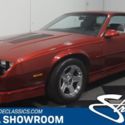 1989 Chevrolet Camaro IROC Z/28 Coupe 5.7 Liter TPI V8 Automatic Classic Vintage
1989 Chevrolet Camaro IROC Z/28 Coupe 5.7 Liter TPI V8 Automatic Classic Vintage
Mileage: 77770
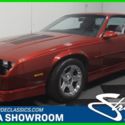 1989 Chevrolet Camaro IROC Z/28 Coupe 1989 IROC Z/28 Used 5.7L V8 16V Automatic
1989 Chevrolet Camaro IROC Z/28 Coupe 1989 IROC Z/28 Used 5.7L V8 16V Automatic
Mileage: 77770
 1985 Chevrolet Camaro IROC-Z28 Sport Coupe
1985 Chevrolet Camaro IROC-Z28 Sport Coupe
Mileage: 11,464
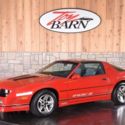 1985 Chevrolet Camaro IROC-Z Red 2DR COUPE Z28 SPORT Automatic
1985 Chevrolet Camaro IROC-Z Red 2DR COUPE Z28 SPORT Automatic
Mileage: 4,922
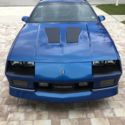 1989 Chevrolet Camaro Iroc Z 5.7 350 engine with t tops 89 Camaro Iroc Z
1989 Chevrolet Camaro Iroc Z 5.7 350 engine with t tops 89 Camaro Iroc Z
Mileage: 120516
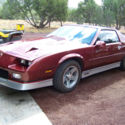 1989 Chevrolet Camaro Iroc-Z Coupe 2-Door 5.7L
1989 Chevrolet Camaro Iroc-Z Coupe 2-Door 5.7L
Mileage: 124,300
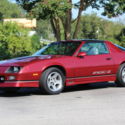 1989 Chevrolet Camaro Iroc-Z Coupe 2-Door 5.7L LS1 Swap
1989 Chevrolet Camaro Iroc-Z Coupe 2-Door 5.7L LS1 Swap
Mileage: 52,000
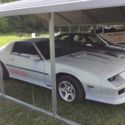 1989 CHEVROLET CAMARO IROC Z 5.7 COUPE PROJECT with every option
1989 CHEVROLET CAMARO IROC Z 5.7 COUPE PROJECT with every option
Mileage: 78,154








 1989 Chevrolet Camaro Iroc-Z Coupe 2-Door 5.0L
1989 Chevrolet Camaro Iroc-Z Coupe 2-Door 5.0L
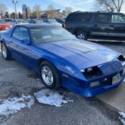 1989 Chevrolet Camaro IROC Z 0 Blue Coupe 8 Automatic
1989 Chevrolet Camaro IROC Z 0 Blue Coupe 8 Automatic